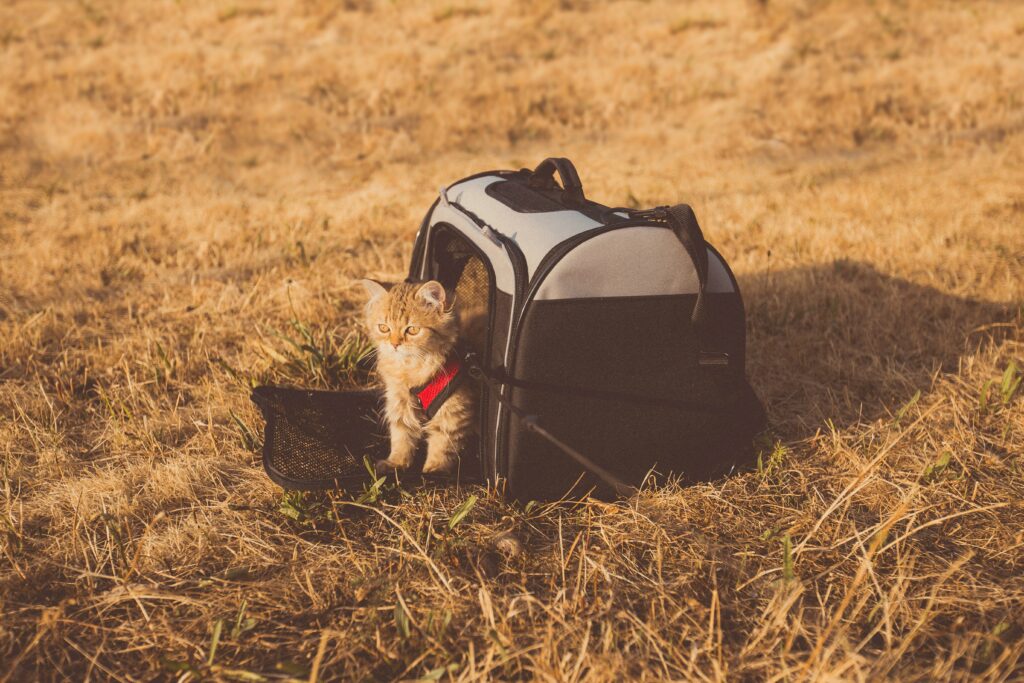
Contents
Introduction
Traveling with pets can be a rewarding experience, but it comes with its own set of challenges. Whether you’re taking a road trip, flying across the country, or simply heading to the local park, pets can experience health issues while on the go. Pet sickness while traveling is not uncommon, and it can range from mild symptoms like nausea to severe conditions like dehydration, heatstroke, or infections.
Knowing what to do if your pet becomes sick while traveling can make all the difference. In this blog, we will explore common reasons pets get sick while traveling, how to manage the situation, and when it’s time to seek emergency pet care.
Common Causes of Pet Sickness While Traveling
There are several reasons why pets may get sick during travel, including stress, motion sickness, and changes in their environment. Understanding these causes can help you prepare for potential issues:
- Motion Sickness
Just like humans, pets can suffer from motion sickness. The constant movement in a car, plane, or boat can cause nausea and vomiting, especially in puppies and kittens. Some pets are more prone to motion sickness than others, particularly if they aren’t accustomed to traveling. - Stress and Anxiety
Travel can be stressful for pets, especially if they are in an unfamiliar environment. Anxiety can lead to symptoms like vomiting, diarrhea, excessive drooling, or panting. Changes in routine, new surroundings, and even long periods of confinement can trigger these reactions. - Changes in Diet or Water
If you’re traveling to a new location, your pet may be exposed to different food or water sources. This can cause digestive upset, vomiting, or diarrhea. Sudden changes in diet or drinking contaminated water are common culprits of pet gastrointestinal issues. - Heatstroke or Dehydration
Traveling during hot weather can put pets at risk for heatstroke or dehydration, especially if they are left in a hot car or exposed to the sun for long periods. Pets that are not hydrated properly or are overexerted in the heat can quickly become ill. - Infections or Exposure to New Environments
While traveling, pets can be exposed to new germs, bacteria, or viruses, particularly if they come into contact with other animals. Areas like public parks, rest stops, or pet-friendly hotels can be breeding grounds for infections, which can cause symptoms like lethargy, fever, or vomiting.
Recognizing Pet Health Issues While Traveling
If your pet becomes sick while traveling, it’s essential to know the signs of illness and how to respond quickly. Here are some symptoms that should prompt immediate attention:
- Vomiting or Diarrhea
If your pet is vomiting repeatedly or has diarrhea during travel, it could be a sign of a gastrointestinal issue, stress, or poisoning. If these symptoms persist for more than a few hours, it’s time to seek emergency care for pets. - Excessive Drooling or Panting
Excessive drooling or panting could indicate motion sickness, anxiety, or heatstroke. If your pet is having trouble breathing, seems unusually restless, or is unable to calm down, it may be time to stop and get veterinary help. - Lethargy or Weakness
If your pet becomes unusually tired, lethargic, or refuses to eat or drink, it could be a sign of something more serious, such as dehydration, infection, or heatstroke. - Tremors or Seizures
Tremors, shaking, or seizures during travel should be considered an emergency. This could indicate extreme anxiety, poisoning, or a serious medical issue that requires urgent attention. - Uncontrollable Coughing or Breathing Difficulty
If your pet is coughing uncontrollably or struggling to breathe, it’s a red flag that something is wrong. This could be due to motion sickness, respiratory issues, or a foreign object lodged in the airway. Get to the nearest vet as quickly as possible. - Excessive Drinking or Urinating
If your pet is drinking excessive amounts of water or urinating more than usual, it could be a sign of heatstroke, diabetes, or kidney issues. This is a serious symptom that should be addressed immediately.
What to Do If Your Pet Gets Sick While Traveling
If your pet becomes sick while traveling, staying calm and taking prompt action is critical. Here’s what you should do:
- Stop and Assess the Situation
If you’re in a car, pull over to a safe location and assess your pet’s condition. If they’re vomiting, drooling, or showing signs of distress, make sure they are as comfortable as possible. If your pet is having trouble breathing or seems disoriented, it’s essential to stop and seek help. - Keep Your Pet Hydrated
If your pet is dehydrated, offer them water in small sips. For pets with motion sickness, you can try ice cubes to make drinking easier. Make sure your pet has access to fresh water at all times, especially during travel in hot weather. - Provide a Calm Environment
If your pet is anxious or stressed, try to create a quiet and calm environment. If traveling by car, avoid sudden stops and loud noises. Keep your pet in a comfortable space and limit their exposure to new environments until they’re feeling better. - Contact a Local Emergency Vet
If your pet’s condition worsens or doesn’t improve after a short rest, contact a nearby emergency vet clinic for advice. If you’re in a new location, use Google or a pet-specific app to find an emergency pet clinic nearby. - Avoid Giving Medications Without Vet Approval
Never give your pet human medications or over-the-counter remedies for nausea, diarrhea, or anxiety without consulting a vet first. Some medications can be harmful to pets, and you need professional advice on how to handle the situation.
When to Seek Emergency Pet Care
Certain symptoms indicate that your pet’s condition requires immediate emergency care for pets. You should seek urgent help if:
- Vomiting or diarrhea persists for more than 24 hours.
- Your pet is exhibiting signs of dehydration, such as dry gums or a lack of energy.
- There’s a noticeable change in your pet’s behavior, like confusion, aggression, or excessive tiredness.
- Your pet is having trouble breathing, or their gums turn pale or blue.
- If your pet has ingested something toxic, such as food, chemicals, or plants.
Conclusion
Traveling with pets can be a joyful experience, but it comes with its own set of challenges. Pet sickness while traveling can happen unexpectedly, and knowing how to recognize the symptoms and act quickly is crucial. Whether it’s motion sickness, stress, or a serious health issue, staying calm and getting your pet the help they need can prevent complications and ensure they recover quickly.
At North MS Pet Emergency, we are always available to provide urgent care for your pets, even if you’re far from home. Whether it’s a holiday, weekend, or late-night emergency, our clinic is here to help when your pet needs care the most.
Contact Us Now for immediate care, or visit us for emergency care for pets during your travels.




